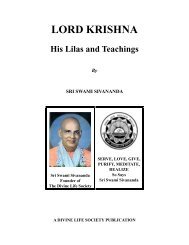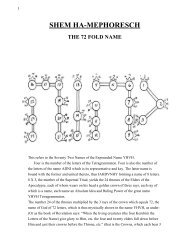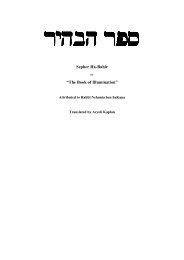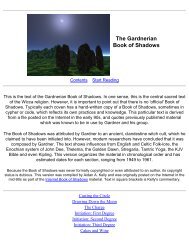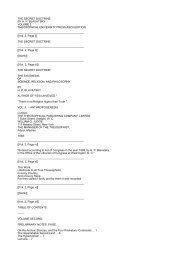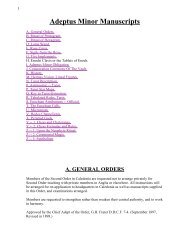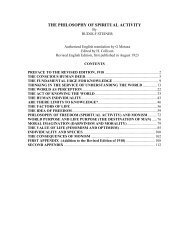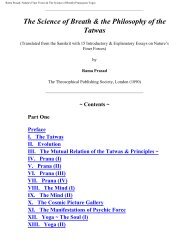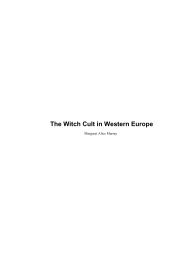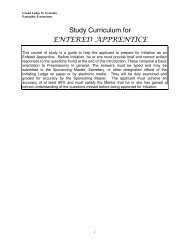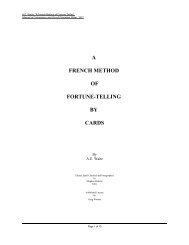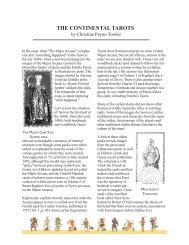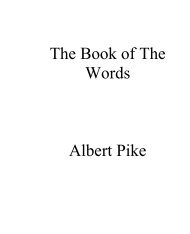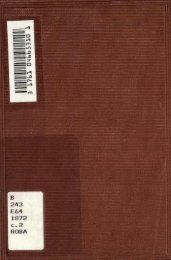You also want an ePaper? Increase the reach of your titles
YUMPU automatically turns print PDFs into web optimized ePapers that Google loves.
The Doctrine Of Eternal Life.<br />
bones, thou hast collected thy members." Recueil de Travaux, t. v., p. 40 (1. 287).<br />
3. <strong>Book</strong> <strong>of</strong> <strong>the</strong> <strong>Dead</strong>, Chapter LXXXVI., 1. 11.<br />
4. Papyrus <strong>of</strong> Ani, pl. vii., 1. 28, and pl. xix., 1. 8.]<br />
{p. lix}<br />
divine body rested in Annu."[1] In this respect <strong>the</strong> god and <strong>the</strong> deceased were on an equality. As we have<br />
seen above, <strong>the</strong> body nei<strong>the</strong>r leaves <strong>the</strong> tomb nor reappears on earth; yet its preservation was necessary.<br />
Thus <strong>the</strong> deceased addresses Tmu[2]: "Hail to <strong>the</strong>e, O my fa<strong>the</strong>r Osiris, I have come and I have<br />
embalmed this my flesh so that my body may not decay. I am whole, even as my fa<strong>the</strong>r Khepera was<br />
whole, who is to me <strong>the</strong> type <strong>of</strong> that which passeth not away. Come <strong>the</strong>n, O Form, and give breath unto<br />
me, O lord <strong>of</strong> breath, O thou who art greater than thy compeers. Stablish thou me, and form thou me, O<br />
thou who art lord <strong>of</strong> <strong>the</strong> grave. Grant thou to me to endure for ever, even as thou didst grant unto thy<br />
fa<strong>the</strong>r Tmu to endure; and his body nei<strong>the</strong>r passed away nor decayed. I have not done that which is<br />
hateful unto <strong>the</strong>e, nay, I have spoken that which thy ka loveth: repulse thou me not, and cast thou me not<br />
behind <strong>the</strong>e, O Tmu, to decay, even as thou doest unto every god and unto every goddess and unto every<br />
beast and creeping thing which perisheth when his soul hath gone forth from him after his death, and<br />
which falleth in pieces after his decay . . . . . Homage to <strong>the</strong>e, O my fa<strong>the</strong>r Osiris, thy flesh suffered no<br />
decay, <strong>the</strong>re were no worms in <strong>the</strong>e, thou didst not crumble away, thou didst not wi<strong>the</strong>r away, thou didst<br />
not become corruption and worms; and I myself am Khepera, I shall possess my flesh for ever and ever, I<br />
shall not decay, I shall not crumble away, I shall not wi<strong>the</strong>r away, I shall not become corruption."<br />
The sahu or spiritual body.<br />
But <strong>the</strong> body does not lie in <strong>the</strong> tomb inoperative, for by <strong>the</strong> prayers and ceremonies on <strong>the</strong> day <strong>of</strong> burial<br />
it is endowed with <strong>the</strong> power <strong>of</strong> changing into a sahu, or spiritual body. Thus we have such phrases as, "I<br />
germinate like <strong>the</strong> plants,"[3] "My flesh germinateth,"[4] "I exist, I exist, I live, I live, I germinate, I<br />
germinate,"[5] "thy soul liveth, thy body germinateth by <strong>the</strong> command <strong>of</strong> Ra<br />
[1. ###. Lepsius, Todtenbuch, Bl. 77,1. 7.<br />
2. This chapter was found inscribed upon one <strong>of</strong> <strong>the</strong> linen wrappings <strong>of</strong> <strong>the</strong> mummy <strong>of</strong> Thothmes III., and a copy <strong>of</strong> <strong>the</strong><br />
text is given by Naville (Todtenbuch, Bd. L, Bl. 179); for a later version see Lepsius, Todtenbuch, Bl. 75, where many<br />
interesting variants occur.<br />
3. ###. Chapter LXXXIII., 3.<br />
4. ###. Chapter LXIV., 1. 49. (Naville, Todtenbuch, Bd. I., Bl. 76.)<br />
5. ###. Chapter CLIV. (Lepsius, Todtenbuch, 75.)]<br />
{p. lx}<br />
himself without diminution, and without defect, like unto Ra for ever and ever."[1] The word sahu<br />
though at times written with <strong>the</strong> determinative <strong>of</strong> a mummy lying on a bier like khat, "body," indicates a<br />
body which has obtained a degree <strong>of</strong> knowledge[2] and power and glory whereby it becomes henceforth<br />
lasting and incorruptible. The body which has become a sahu has <strong>the</strong> power <strong>of</strong> associating with <strong>the</strong> soul<br />
and <strong>of</strong> holding converse with it. In this form it can ascend into heaven and dwell with <strong>the</strong> gods, and with<br />
<strong>the</strong> sahu <strong>of</strong> <strong>the</strong> gods, and with <strong>the</strong> souls <strong>of</strong> <strong>the</strong> righteous. In <strong>the</strong> pyramid texts we have <strong>the</strong>se passages:--<br />
http://www.sacred-texts.com/egy/ebod/ebod05.htm (4 <strong>of</strong> 21) [8/10/2001 11:23:20 AM]



